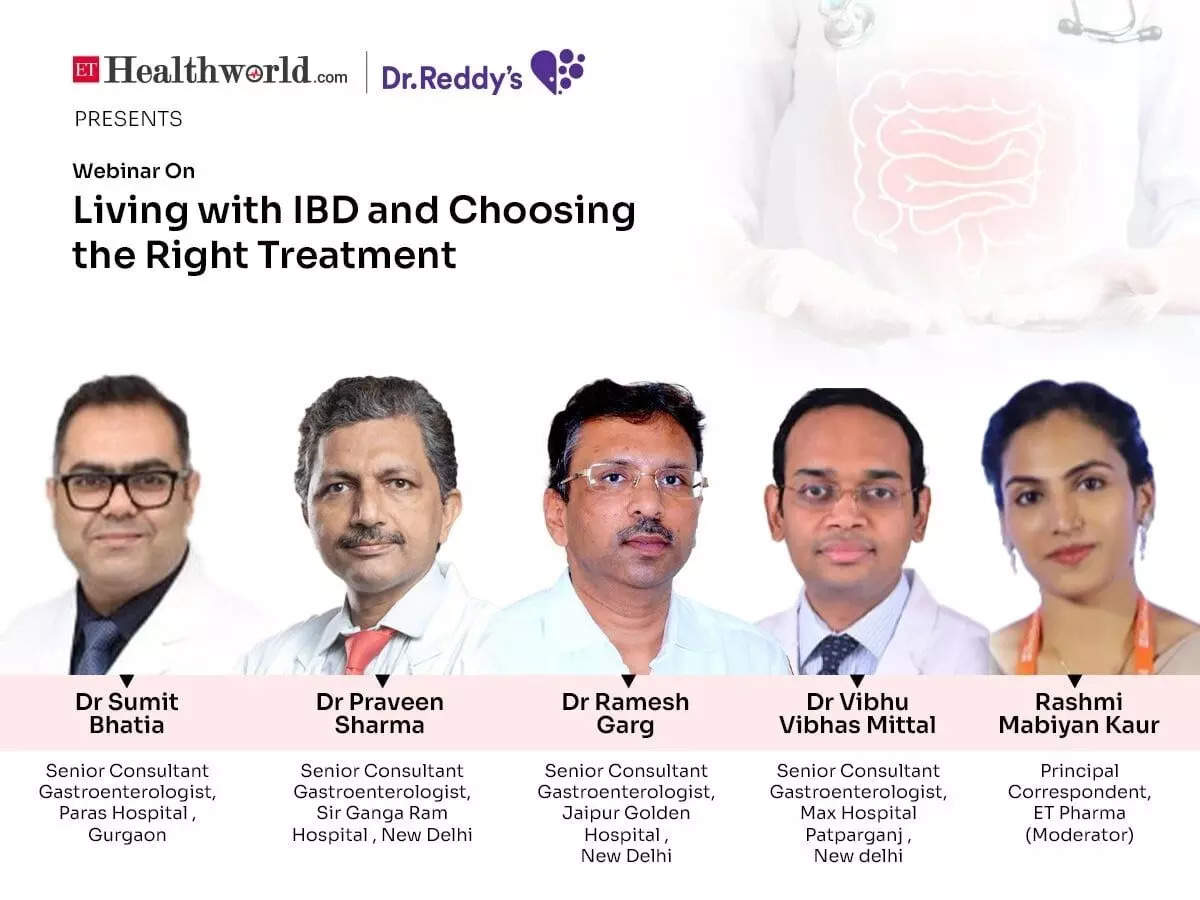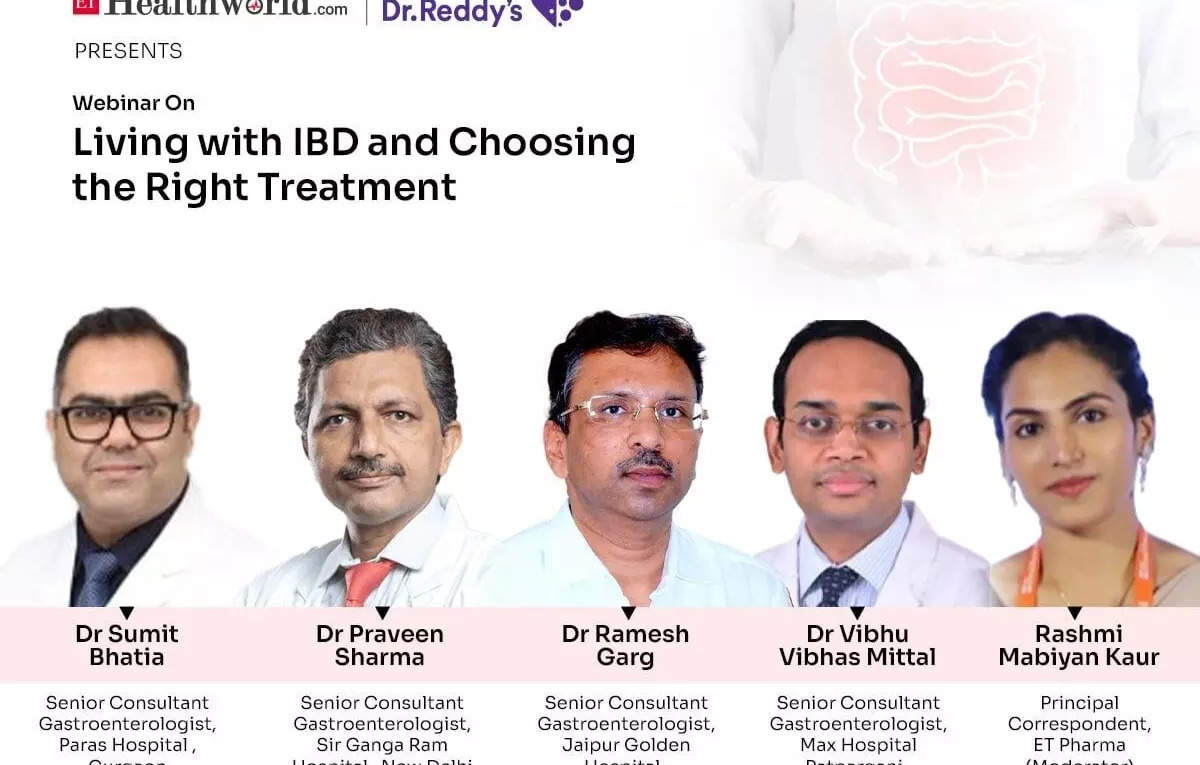
New Delhi: Inflammatory Bowel Disease (IBD) is a chronic condition characterized by recurring inflammation of the gastrointestinal tract. ETHealthworld aims to bring clarity and practical solutions to the challenges faced by patients, while exploring treatment strategies, all aimed at improving the quality of life for individuals living with IBD. The first episode “Living with IBD and choosing the right treatment” of the “Navigating Life with Inflammatory Bowel Disease” series brought together leading gastroenterology experts for an engaging discussion on managing IBD.
The esteemed panellists included—Dr. Sumit Bhatia, Senior Consultant Gastroenterologist, Paras Hospital, Gurgaon; Dr. Praveen Sharma, Senior Consultant Gastroenterologist, Sir Ganga Ram Hospital, New Delhi; Dr. Ramesh Garg, Senior Consultant Gastroenterologist, Jaipur Golden Hospital, New Delhi and Dr. Vibhas Mittal Senior Consultant Gastroenterologist, Max Hospital, Patparganj, New Delhi—explored the nuances of living with IBD, offering insights into dietary adjustments, medical strategies, and support systems.
Dr. Sumit Bhatia began by explaining the role of diet in IBD management. “IBD develops due to dysbiosis—a disruption of gut flora—triggered by environmental factors, including diet,” he said. He emphasized minimizing refined foods, processed items, and additives like emulsifiers and anti-caking agents, which can exacerbate gut inflammation. Opting for natural and less processed foods can help reduce symptoms.
Addressing the distinction between food allergies and intolerances, Dr. Praveen Sharma clarified, “Food allergies are immune-mediated reactions, while intolerances, such as lactose intolerance, result from enzyme deficiencies.” He advised patients to identify and avoid foods that trigger symptoms, like milk in cases of lactose intolerance, while incorporating tolerable alternatives like yogurt.
Dr. Ramesh Garg introduced the Low FODMAP diet, which limits fermentable carbohydrates like oligosaccharides and polyols, to alleviate gut inflammation and improve symptoms. “Avoiding these foods reduces symptoms and addresses the inflammation mechanism,” he said.
Nutritional deficiencies are common in IBD patients, noted Dr. Vibhu. “Symptoms like pain, diarrhoea, and poor appetite lead to malabsorption of nutrients, causing deficiencies in iron, calcium, vitamin B12, and vitamin D.” He recommended regular monitoring through blood tests and incorporating fortified foods or supplements to combat malnutrition and energy loss during active flare-ups.
Dr. Garg highlighted the value of specialized dietitians in managing IBD. “A registered dietitian can create personalized plans tailored to a patient’s symptoms and preferences while addressing deficiencies and sarcopenia,” he said. He stressed the importance of regular monitoring to evaluate nutritional status and adjust plans accordingly.
When asked about complementary treatments, Dr. Praveen Sharma described the roles of remission-inducing and maintenance drugs. “Inducing drugs control acute symptoms, while maintenance drugs help sustain remission,” he said, stressing the need for a strong doctor-patient relationship to navigate these treatment stages effectively.
While anti-diarrheals can improve hydration and reduce stool frequency, Dr. Sharma advised caution. “In acute flares, these drugs may complicate the situation by masking symptoms without addressing underlying inflammation.” Similarly, Dr. Garg warned against using NSAIDs for pain relief in IBD patients, as they can worsen inflammation and cause complications. He recommended safer alternatives like paracetamol or antispasmodic.
Dr. Vibhu also shed light on the importance of managing anemia in IBD. “Iron deficiency leads to fatigue and breathlessness, but proper supplementation can improve hemoglobin levels and enhance well-being,” he explained, advocating for early intervention to manage this common complication.
The discussion concluded with a focus on support systems. Dr. Bhatia highlighted the role of patient-centric groups, such as the South Asian IBD Alliance, in educating patients, dispelling myths, and combating stigma. This enlightening webinar offered a comprehensive guide to managing IBD, empowering patients and caregivers with actionable insights for a better quality of life.
(DISCLAIMER: The views expressed are solely of the author and ETHealthworld.com does not necessarily subscribe to it. ETHealthworld.com shall not be responsible for any damage caused to any person/organisation directly or indirectly)







